#Edyth Hughes
Explore tagged Tumblr posts
Text

From October, 2023
#girl#black and white#Edyth Hughes#silhouette#new york street style#New York#hudson river#canon eos 5d mark iv#original photography on tumblr#blonde#American#model#october 2023#contrast#heavy contrast
34 notes
·
View notes
Text

Edythe Baker by Hugh Cecil, 1927
2 notes
·
View notes
Text

The former Palace Theatre debuts as Guild Theatre, 210 S 2nd St (Casino Center Blvd), with a screening of Spartacus in 1960. Photo: Facing south between Carson & Bridger. Edythe and Lloyd Katz Collection, UNLV Special Collections.
Las Vegas movie theaters: an incomplete timeline
Isis Theatre (c. 1909-1911). Outdoor venue. 23 Fremont.
Majestic (1911-c. 1935). Griffith Building, 127 Fremont. C.P. Squires, owner. Later owned by E.W. Cragin & W. Pike. Beginning in 1915 Cragin & Pike hold outdoor “Air Dome” on shows 2nd St in summer months, and outdoor air dome shows at Fremont & 3rd in the 1920s.
El Portal (1928-1978). Cragin & Pike, builders, owners. Charles Alexander MacNelledge, architect. First air conditioning in Las Vegas. El Portal Theatre timeline.
Airdome Follies Theater, aka Airdome Theater (1931). Outdoor venue, 1st & Carson.
Palace (1932-1960) renamed Guild (1960-c. 1976). 210 S Casino Center. R.W. Thomas, owner. A.L. Worswick, architect. Later owned by Katz. Replaced by Golden Nugget parking.
Vegas Theatre (1943-1948?) 1518 Fremont.
Huntridge Theatre (1944-c. 1990) Huntridge Theatre timeline.
Western, aka New Western (1944-1950s) 114 S 1st.
Fremont Theatre (1947-1975) 226 Fremont. Owned by Katz 50s-70s.
Motor-Vu Drive-In (1948-1959) aka Stardust Drive-In (1959-1968). Located adjacent to Frontier hotel. Unaffiliated with Stardust hotel & casino.
Skyway Drive-In (1954-1981) 4035 Boulder Hwy.
Fox Theatre (1965-1988) Charleston Mall Plaza, 1800 E Charleston
Cinerama (1965-1977) 3900 Paradise Road
Red Rock Theatres (1966-2000) 5201 W Charleston Blvd. Built by Lucille Cragin, original design by Hugh Taylor.
Bonanza Movie Palace (1967-1973) Bonanza Hotel & Casino, 3645 LVBS. Unclear whether the theater operated continuously.
Flick Theatre (1969-1994) 719 E. Fremont. Began showing art films, soon moved to XXX.
Parkway Theatre (1970-1995) Boulevard Mall
Cinemas 1,2,3 (1972-1986) 414 Fremont. Triplex, Lloyd Katz, Nevada Theatre Corp. Called Las Vegas Dollar Cinemas late 80s.
Gaiety Theatre (1972-1977) 1304 LVBS. XXX
Rancho Circle Theatre (1973), renamed El Rancho Teatro (1975) at Rancho Circle Shopping Center, 2401 W Bonanza Rd. Eddie Escobedo, Jaime Yepes‘ El Rancho Teatro showed Spanish language films.
Desert 5 Drive-In (1975-90s?) 2606 S. Lamb Blvd
Sources: Picture Show, Las Vegas Age, 4/8/1911; “Majestic Green Airdome” (ad) Las Vegas Age, 7/17/20; “Gala Fete at El Portal Planned Tonight.” Las Vegas Age, 6/21/28; “Airdone Follies Theatre” (ad) Review-Journal, 6/6/31; “Palace Theatre Will Open Doors.” Review-Journal, 5/2/32; “New Western” (announcements, ads), Review-Journal, 6/30/44; Ashbaugh, D. “New Guild Theater Completes.” Review-Journal, 10/31/60; “Theatre opening set.” Review-Journal, 4/30/72; Ceremonies set for theater opening. Review-Journal, 9/12/75; Horowitz, D. “Locklead wowed ‘em at the old Majestic.” Review-Journal, 4/25/76; E. Harrington. “Las Vegas’ First Shows.” The Nevadan, 12/18/77; Guide to the Edythe and Lloyd Katz Photographs, UNLV Special Collections; Cinema Treasures; Classic Las Vegas.
1 note
·
View note
Photo
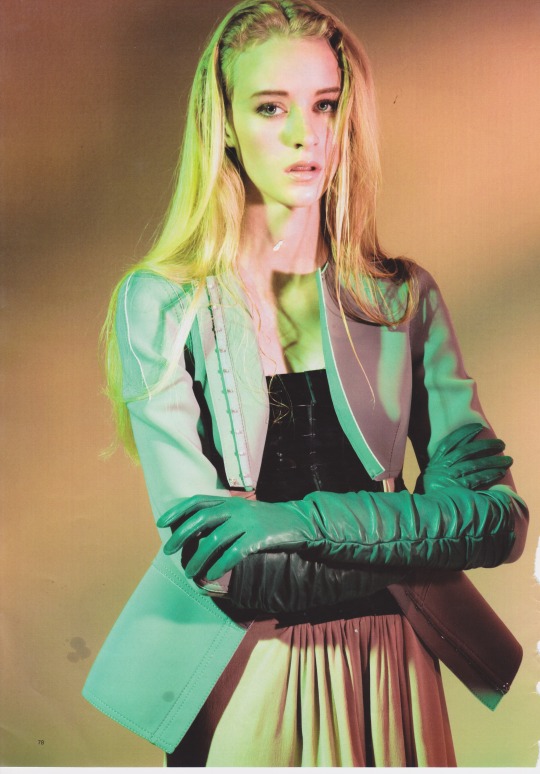
Edythe Hughes
#gray leather gloves#leather gloves#gloves#blazer#skirt#businesswear#business attire#edythe hughes#fashion#my scans
10 notes
·
View notes
Text
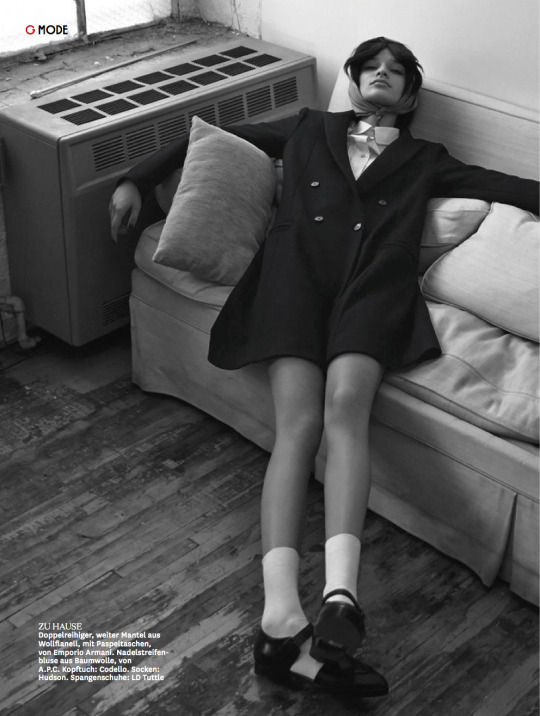
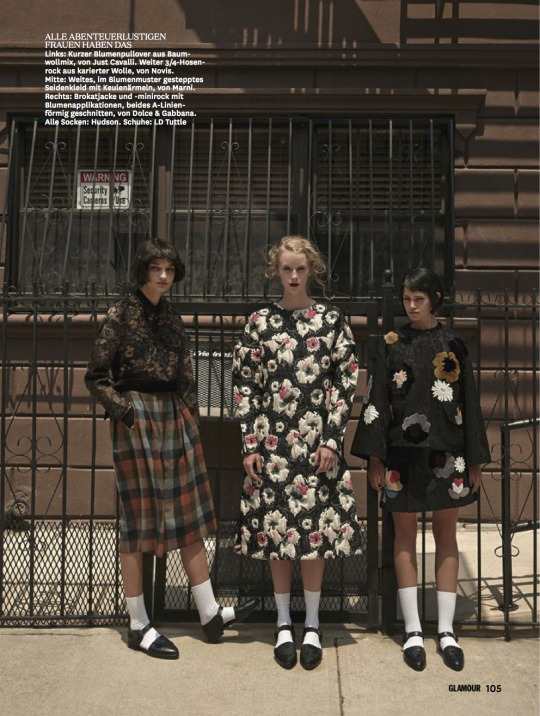
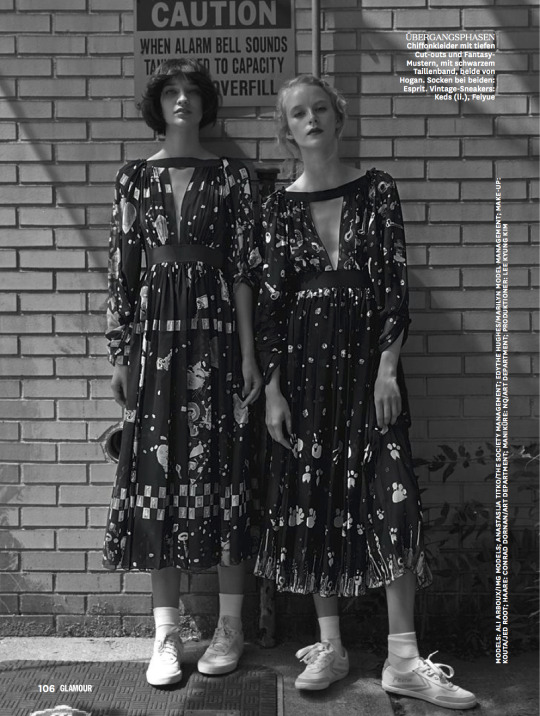
Ali Arboux, Anastasija Titko and Edythe Hughes for Glamour Germany October 2014 by Hong Jang Hyun
#Ali arbour#Anastasia titko#Edythe hughes#glamour germany#hong jang hyun#2014#fashion#fashion editorial#fashion photography
8 notes
·
View notes
Photo
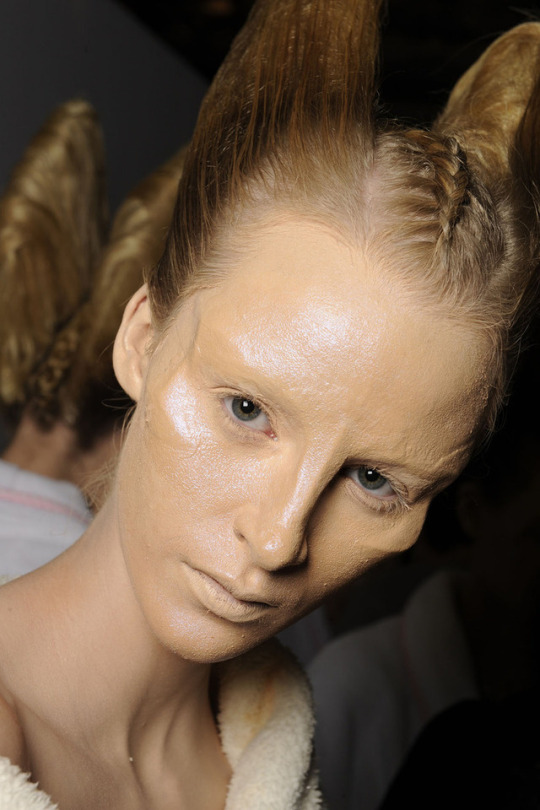
Edythe Hughes Backstage @ Alexander McQueen S/S 2010, Paris
#edythe hughes#backstage#alexander mcqueen#mcq#mcqueen#pfw#model#model backstage#beauty#make up#beauty backstage
8 notes
·
View notes
Photo

Edythe Hughes for Barbara Tfank, Resort 2011
6 notes
·
View notes
Text
Episode 7: "The V-Word" (Show Notes)
listen along here
[00:04:01] Some articles reflecting on “the YA Boom”
[00:07:57] Follow for pictures of Kacie’s dog
[00:13:14] Information confirming your bias about confirmation bias
[00:14:23] G's folklore section library book haul

[00:15:21] I did some rEsEaRcH and couldn’t find a pre-Midnight Sun interview where Stephenie Meyer specifically names "Hybrid Theory" as the CD Edward and Bella listen to (drop me a line if you have one), but she did put “With You” on her Twilight playlist back in 2005!
[00:16:20] G was almost correct—this deleted scene of Edward wearing shoes on Bella's bed is actually a nightmare sequence from New Moon
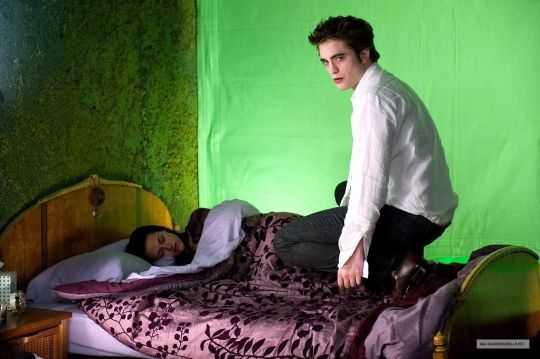
[00:16:47] Sarah Catherine Hook as the vampire Juliette in First Kill (rip to that very fun show), pictured here wearing shoes on her bed
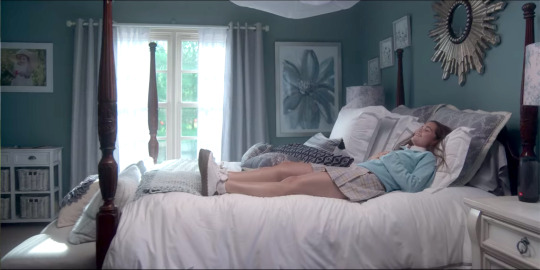
[00:17:38] Nikki Reed's husband Ian Somerhalder as the vampire Damon in The Vampire Diaries reading Twilight (impossible to determine whether he is wearing shoes on the bed; we may or may not have tracked down this episode and tried)
bonus:

[00:29:09] More on “Avatar: the Last Airbender rules”
[00:32:57] In case you wanted to join in Shannon and Kacie's sing along
[00:40:34] The “Jessica’s boobs” movie scene
[00:46:33] Shannon’s "Nightmare Edythe" look


and the video version on our new Tiktok!
bonus:


[00:52:15] the AO3 and Fanfiction.net search results of Twilight fanfictions titled “Dusk:”


[00:55:50] What Edward would wear to a dance, left to his own devices:
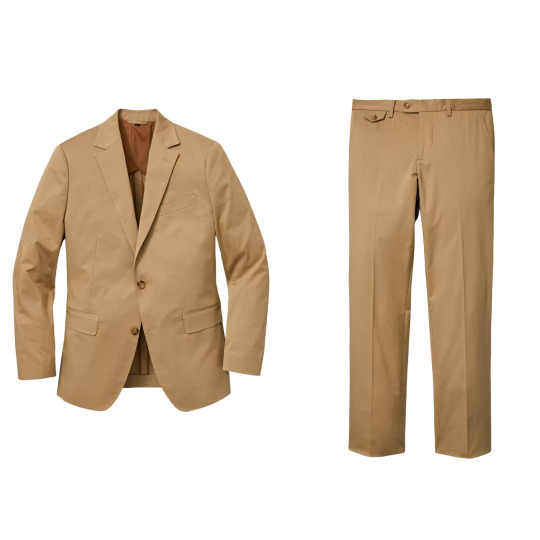
[00:56:46] The AOL dial-up tone
[01:08:55] Stephenie Meyer’s Austen obsession, in her own words
[01:11:48] Hugh Grant in a cravat in Sense and Sensibility (1995)
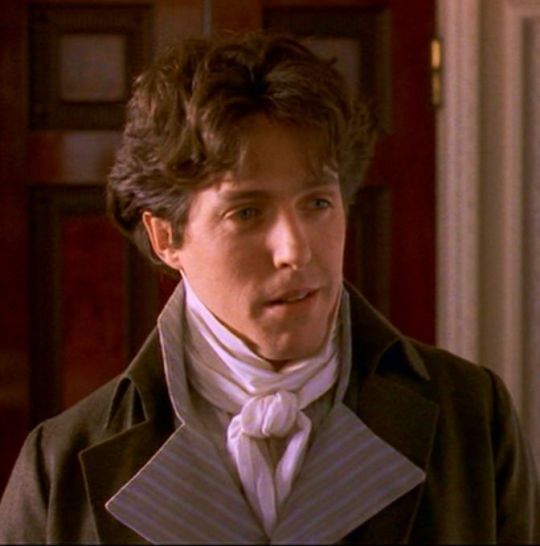
[01:20:50] More information on Peter, Charlotte, and Maria
[1:22:35] Read Shannon’s version of the Calgary Incident here
[1:23:48] On "breatharians"
[1:27:43] On Tumblr’s “war on tiddies”
thanks for tuning in for another episode! Maybe the real v-word was "very silly"
#show notes#episode 7#twilight renaissance#twilight revival#midnight sun#life and death#the twilight saga#podcast#twilight podcasts
13 notes
·
View notes
Photo

ali arboux, anastasija titko and edythe hughes by hong jang hyun for glamour germany october 2014
7 notes
·
View notes
Text
HELLO LOLA
1925

Hello Lola is a three act musical by William B. Kernell (music) and Dorothy Donnelly (book and lyrics), based on the novel Seventeen by Booth Tarkington and the 1918 stage adaptation Seventeen by Hugh Stanislaus Stange and Stannard Mears.
The musical takes place at the Baxter and Parcher homes in Indianapolis in 1900.In the story, Willie Baxter becomes infatuated with a Lola, a shallow, baby-talking minx visiting for the summer. The local girls see through her. When her visit is over, Willie is devastated, but his handyman Genesis convinces him that life goes on.

The original production was produced by Lee and J.J. Shubert. It opened on Broadway at the Eltinge 42nd Street Theatre on January 12, 1926. On February 8th it moved to Maxine Elliott’s Theatre on 39th Street. The musical closed on February 20, 1926 after just 47 performances.
To say that Lola’s road to Broadway was a bumpy ride would be an understatement. Even once at its destination, the musical didn’t settle down.

The first performance was held at the Broad Street Theatre in Newark, New Jersey, on November 16, 1925. It stayed there for a week before moving south to Nixon’s Apollo Theatre in Atlantic City. It made one more stop in Washington DC before the Shuberts decided that the show would take a break for the holidays.

Although initial out-of-town notices were kind, problems were apparent from the beginning. Although Lawrence Marston was credited as director on the road, his name was curiously absent once the show arrived in New York. Even the Shuberts left their name off the title page, a stunning ‘no confidence’ vote by Lola’s godfathers. This was painfully apparent by their choice of venue. A Shubert musical was unlikely to be plugged into the more intimate Eltinge. They quickly were shuffled off to 39th Street’s to die. With its out-of-the-way location and low patron cap, the Maxine Elliott was Lola’s hospice.

The title role was initially played by Madeline Fairbanks, but she was fired on the road and replaced with Edythe Baker (above). Baker’s specialty was playing the piano, so the the score integrated a piano solo for her. This required the production to justify why there’s a piano on the lawn!
“She can play the piano, but she can’t play Lola.” ~ BURNS MANTLE
The New York critics were not kind to Baker (one calling her “a total loss”) and she left the show a few days in. She was replaced by her understudy, who was playing May Parcher. When Baker went, so did her grass-side piano solos.

Baker wasn’t the only one maligned by the punters. Marjorie White, who played Willie’s sweet younger sister Jane, was called ““a miniature Texas Guinan” and compared to Sophie Tucker. The best the crix could say about her was that she was “vociferous”.
The New York Times called the casting “a weirdly assembled collection of principals”. The score, while not offensive, was not memorable. Except for “My Baby-Talk Lady” which was sung no less than four times in the evening. That’s one more time than standard advertising messages.

The other complaint was that the teenagers of the story (remembering the title of the source material) were mostly played by adults. White Way wags dubbed the show Booth Tarkington’s “Thirty-Seven”. The press urged Tarkington’s friends to keep him away. [Note: The above blind item about a raid by the Gerry Society (aka New York Society for the Prevention of Cruelty to Children founded by Elbridge T. Gerry), may have been facetiously apocryphal.]
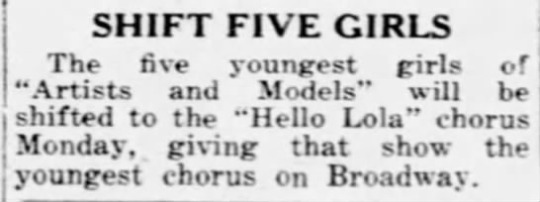
Apocryphal or not, at the beginning of February the production reacted by doing a chorus swap.
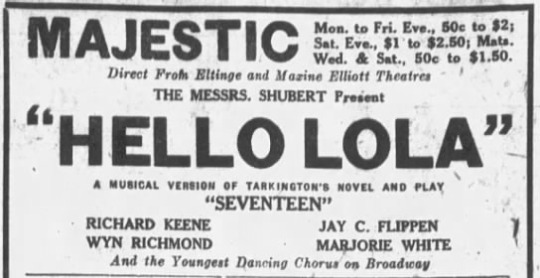
After saying goodbye Broadway, Hello Lola said hello Brooklyn, decompressing at the Majestic, but not venturing any further.

Possibly the only cast member to be the right age was seventeen year-old Margaret Brooke Sullavan, who made her Broadway debut as Miss Boke. To get her “big break” she lied about her age, telling producers she was a few years older than she actually was. During her career, she preferred stage to screen, but in 1939 she was nominated for an Oscar for Three Comrades. Her husbands included Henry Fonda, William Wyler, and Leland Hayward.
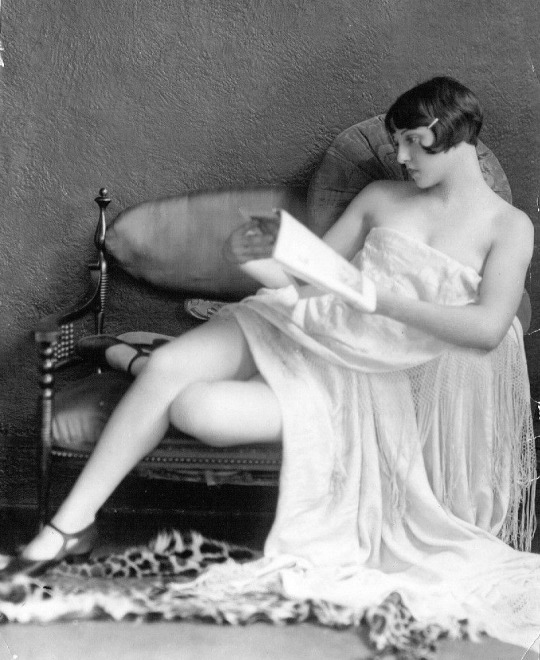
Ensemble member Sylvia Carol was depicted in several provocative photos subtitled “Relaxing on the set of ‘Hello Lola’”.

In an attempt to right the sinking SS Lola, two popular songs were interpolated into the score: “Has Anybody Seen My Gal?” and “That Certain Party,” both sung by Jay C. Flippen as Genesis, the Baxter’s caretaker. In 1925, this was a ‘burnt cork part’ (aka blackface). Flippen had been discovered by famed African-American comedian Bert Williams, and also served as his replacement in a previous show. Flippen went on to a prolific career in films and television.

Despite the failure of Hello Lola, the source material still had life in it. In 1940 there was a feature film starring Jackie Cooper and Betty Field.

In 1951, the Shuberts tried again with a new musical version of Seventeen starring Kenneth Nelson and Ann Crowley. It was adapted by Sally Benson (Junior Miss) with music by Walter Kent and lyrics by Kim Gannon. It bested its predecessor’s run by 135 performances.
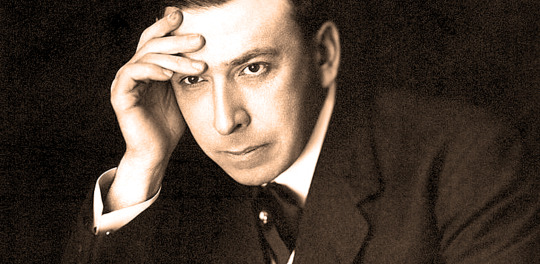
Booth Tarkington died in 1946, so he was spared a second failed musical of Seventeen, which was also (as of this writing) the last Broadway credit with his name attached. His greatest success on stage was 1918′s Clarence, which ran 300 performances and started in Atlantic City! But that’s another blog.
#Hello Lola#Seventeen#Booth Tarkington#Shuberts#1926#Atlantic City#Musical#Broadway#Eltinge Theatre#Maxine Elliott's Theatre#Margaret Sullavan#Sylvia Carol#Marjorie White#Edythe Baker
1 note
·
View note
Text

From October, 2023
#Edyth Hughes#blonde#womens style#New York#new york street style#hudson river#canon eos 5d mark iv#original photography on tumblr#november 2023
10 notes
·
View notes
Text
March 27 in Music History
1416 Birth of composer Antonio Squarcialupi.
1603 Birth of composer William Smith.
1702 Birth of composer Johann Ernst Eberlin.
1710 Birth of composer Joseph Marie Clement dall' Abaco.
1737 Birth of composer Francesco Zannetti.
1745 FP of G. F. Handel´s oratorio Belshazzar at the King's Theater in London.
1746 Birth of composer Augustin Ullinger.
1757 Death of composer and violinist Johann Stamitz.
1757 Birth of composer Richard John Samuel Stevens.
1760 Birth of composer Ishmail Spicer.
1808 Franz Joseph Haydn gives his last public appearance at a performance of his oratorio The Creation.
1816 Birth of English organist George Elvey in Canterbury.
1827 Dr. Johann Wagner performed an autopsy on Beethoven, revealing a severely cirrhotic and shrunken liver as the cause of death.
1833 Birth of American soprano Genevieve Ward in NYC.
1843 Birth of English organist Charles MacLean in Cambridge.
1851 Birth of French composer Vincent d'Indy, in Paris.
1853 Birth of composer Carl Valentine Lachmund in Booneville, MO.
1854 Birth of Belgian composer Edgar Tinel.
1854 FP of Dorn's opera "Die Nibelungen", in Berlin.
1858 Birth of American composer Peter Christian Lutkin in Wisconsin.
1862 Birth of Argentinian composer Arturo Berutti in San Juan.
1863 Birth of Spanish tenor Francesco Vignas in Barcelona.
1867 Birth of American soprano Edyth Walker in Hopewell, N.Y.
1872 Birth of Spanish bass Andrés De Segurola in Valencia. 1873 Birth of Italian soprano Giannina Russ in Milan.
1876 Birth of American ragtime composer William H. Tyers.
1883 Birth of composer Jan Kunc.
1885 Birth of Dutch composer Harry Cox in Amsterdam.
1892 Birth of American composer and arranger Ferde Grofé in NYC.
1898 Birth of English contralto Edith Furmedge.
1901 Birth of composer Albert Henneberg.
1912 Birth of American composer Reuel Lahmer.
1912 Birth of composer Robert Watson Hughes.
1913 Birth of composer Godfrey Turner.
1914 FP of R. Vaughan Williams´ original version of Symphony No. 2 A London Symphony, at Queen's Hall in London.
1917 FP of G. Puccini's opera La Rondine "The Swallow", at the Opéra du Casino in Monte-Carlo.
1920 Birth of conductor and harmonica virtuoso Richard Hayman.
1920 FP of Vaughan Williams A London Symphony (No 2) at Queens Hall, conducted by Albert Coates.
1924 Death of English organist Walter Parratt in Windsor.
1925 Birth of German-American composer Frank Lewin in Breslau, Germany.
1925 FP of Edward Joseph Collins' Piano Concerto No. 1 in Eb, by the Chicago Symphony, conducted by Frederick Stock with composer as soloist.
1927 Birth of Russian cellist and conductor Mstislav Rostropovich in Baku.
1928 Birth of English soprano Pauline Tinsley in Manchester.
1931 Birth of composer Yoriaki Matsudaira.
1936 Birth of American composer Malcolm Goldstein.
1943 Death of Swiss pianist Emile Blanchet in Pully.
1946 Birth of American baritone John Sandor in Fairmont, WV.
1949 Birth of Danish composer Poul Ruders in Ringsted.
1950 Birth of American mezzo-soprano Maria Louise Ewing in Detroit.
1954 Birth of French composer Thierry Lancino in Civray, France.
1960 FP of Toshiro Mayuzumi's Mandala-Symphonie in Tokyo.
1975 Death of British composer Sir Arthur Bliss, at age 83, in London.
1984 FP of Andrew Lloyd-Webber's musical Starlight Express in London.
1992 Death of Norwegian composer Harald Sæverud in Bergen.
2001 FP of Kevin Volans´ String Quartet No. 6, by the Vanbrugh Quartet, in London.
2002 FP of Osvaldo Golijov's Three Songs for Soprano and Orchestra with Soprano Dawn Upshaw and the Minnesota Orchestra on a program with Haydn and Schumann. Work replaced the premiere of Golijov's violin concerto, which had been scheduled. It was canceled after soloist Pamela Frank developed a repetitive stress injury.
2003 FP of Robert X. Rodriguez's Decem Perfectum.
2005 Death of American pianist Grant Johannesen in Berlin.
2 notes
·
View notes
Photo
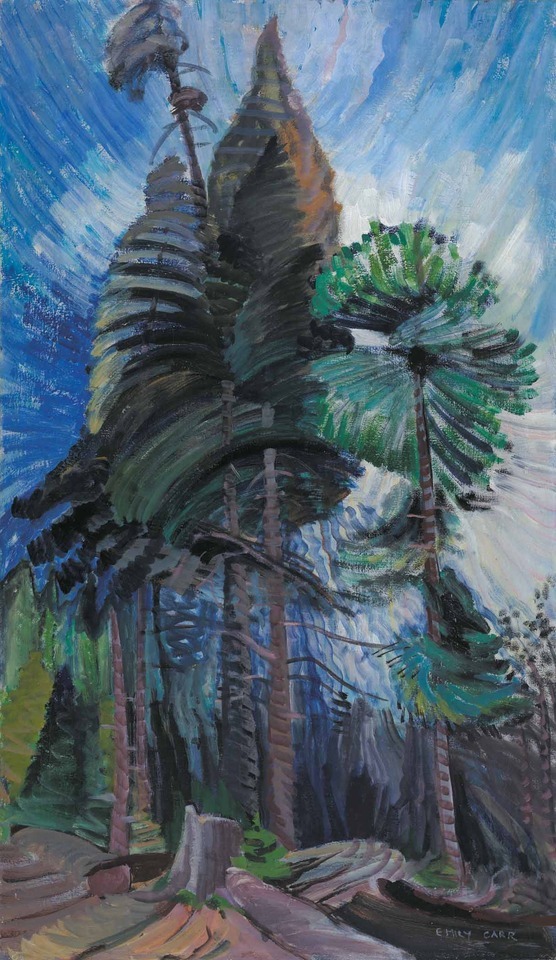
Wind in the Tree Tops, 1935, Emily Carr
For fifteen years she camped out in cabins, tents, log huts, tool sheds, lighthouses, boathouses and garages. She told Ira Dilworth that the most outstanding event in her life was: “the buying of an old caravan trailer which I had towed to out-of-the-way corners where I sat self-contained with dogs, monk and work �� Walt Whitman and others on the shelf – writing in the long, dark evenings after painting”. Emily purchased the “Elephant”, as she called the caravan trailer, from Hugh McAlpine in July 1933. The “Elephant” spent its first winter “bedded down opposite the Four Mile House in a quiet pasture”. In May 1934 the “Elephant” was towed to Metchosin where it remained at different locations until 1938 when Emily sold it.
Practical considerations influenced the choice of sites: the “Elephant” had to be hauled to a level roadside site. Friends’ farms in Metchosin often served as a location. Emily painted quite ordinary scenes: a landscape near a road, a small wood above a gravel pit, logged over hillsides viewed from Metchosin Road. Edythe Hembroff-Schleicher, a young painter friend who often accompanied Emily on painting trips, writes: “What people do not realize is that Emily could sit in front of a clump of trees and paint a forest”.
—West Shore Arts Council
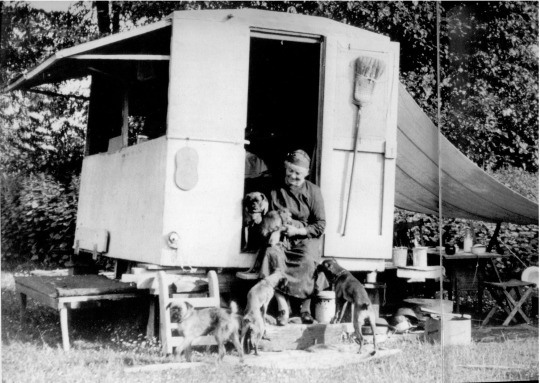
1 note
·
View note
Photo
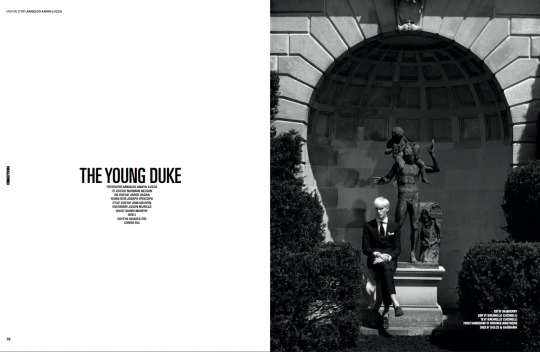








THE YOUNG DUKE: CONOR MCLAIN AT SOUL ARTIST MANAGEMENT AND EDYTHE HUGHES AT FORD MODELS PHOTOGRAPHED BY ARNALDO ANAYA-LUCCA FOR DSECTION MAGAZINE "KING AND THINGS" ISSUE.FASHION BY JOSEPH EPISCOPO,HAIR BY JASON MURRILO AND HAIR BY QUINN MURPHY BOTH AT DEFACTO INC.SPECIAL THANKS TO PAULO DE AMORIM MEIXEDO AT DSECTION.
6 notes
·
View notes
Text

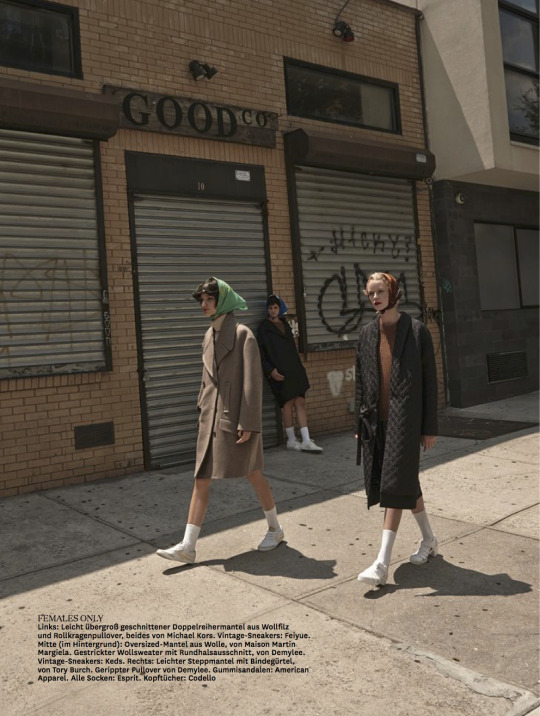
Ali Arboux, Anastasija Titko and Edythe Hughes for Glamour Germany October 2014 by Hong Jang Hyun
#Ali arboux#anastaija titko#edythe hughes#glamour germany#2014#hong jang hyun#fashion#fashion editorial#fashion photography
9 notes
·
View notes
Photo

Edythe Hughes @ Kenzo F/W 2012-13, Paris
43 notes
·
View notes